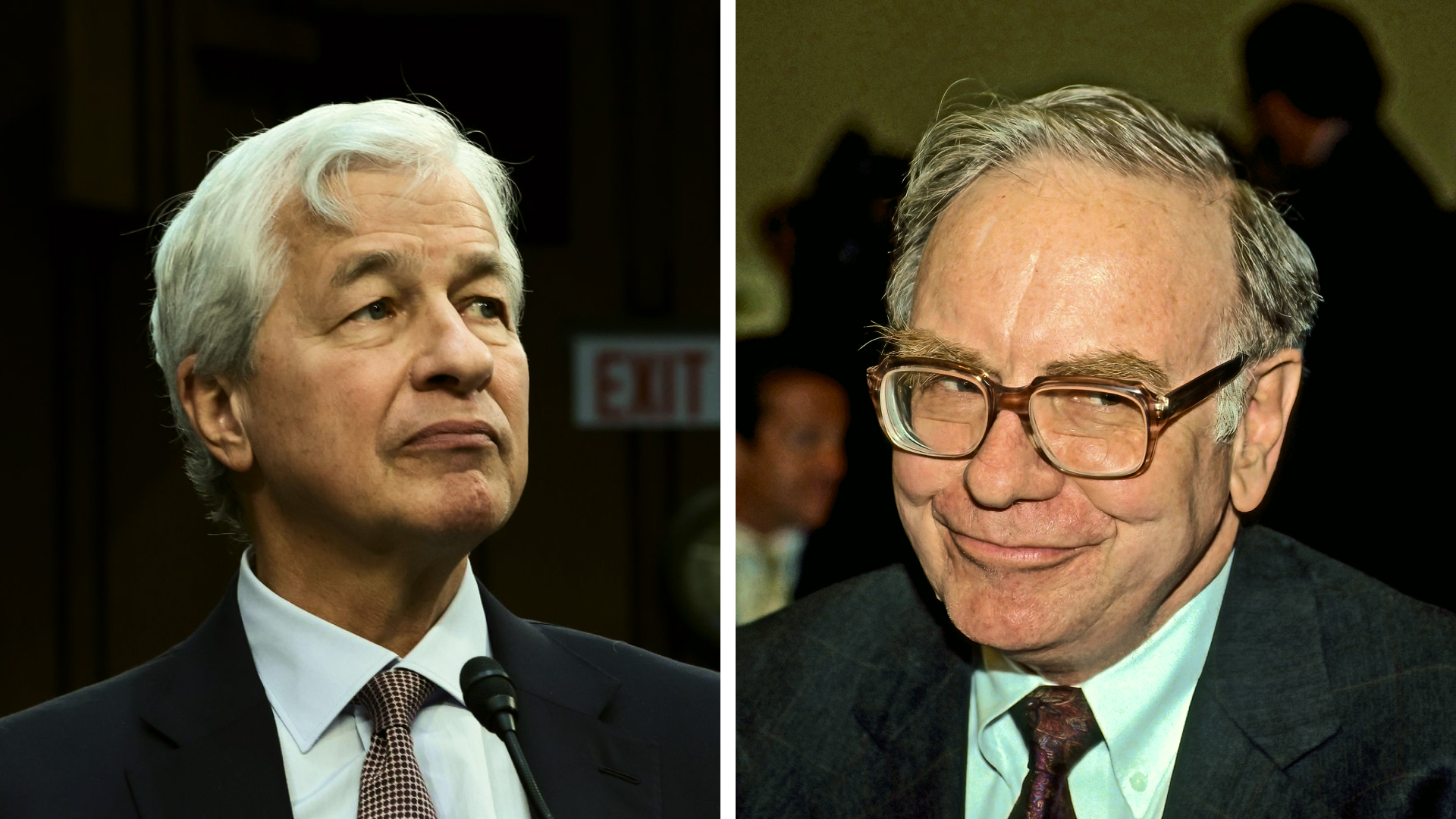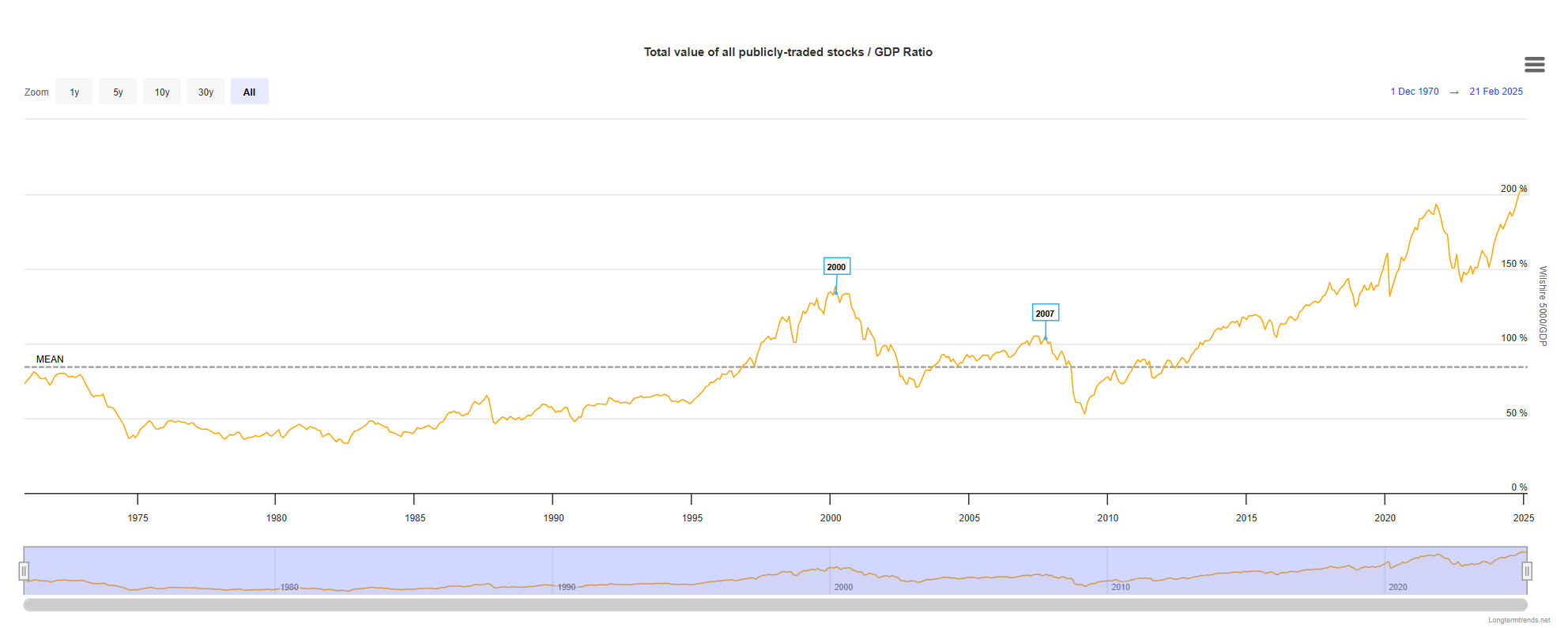Warren Buffett is dumping shares and his favourite valuation metric is flashing sell
Back-to-back annual returns of more than 20% for US stock markets may have prompted Warren Buffett's investment group Berkshire Hathaway to extend its bets that the market is overvalued and set to decline.
Berkshire's annual report just revealed its own stock price has returned a compound 19.6% per year to investors since 1965, versus 10.4% per year for the S&P/500 Index including dividends.
In other words, Buffett's Berkshire has consistently thumped the market for 59 years. And there's plenty of evidence the investment group now expects shares to fall.
Not only has Berkshire net sold shares for more than two years, but it also grew its cash and cash equivalents balance (largely in treasuries) to a record US$334.2 billion over the final quarter of 2024, which is more than double the US$167.6 billion at the end of 2023.
Berkshire's cash holdings are also at a record high 27% of investment assets, according to The Wall Street Journal.

In his annual letter published on February 22, Buffett told investors, "“Berkshire will never prefer ownership of cash-equivalent assets over the ownership of good businesses, whether controlled or only partially owned.”
However, it appears record-breaking share market valuations after a two-year bull run are prompting equities apostle Buffett to position for a downturn.
"Buffett Indicator" warns on sharemarket top
Interestingly, one of the investment guru's favourite valuation metrics is simple to follow and flashing red for frothy valuations.
The 'Buffett Indicator' shows the total market capitalisation of US stocks measured by the Dow Jones US Total Stock Market Index, divided by US gross domestic product (GDP).
After Wall Street posted its worst day of the year on Friday, the total market cap of all US stocks stood at US$59.55 trillion, versus US$29.2 trillion in total US GDP in 2024.
On a back-of-an-envelope calculation, we can see the total market cap of all stocks is just over double the US GDP as of Friday, or more specifically, 204% when you divide total market cap by GDP.
Traditionally, a ratio of just over 100% meant share markets were fair value on the assumption valuations are forward-looking and assume future GDP growth will support future earnings growth.
However, if the total market cap of stocks ends up more than double GDP, it means the market is expecting gangbuster earnings growth to match GDP in the real economy, or shares are wildly overvalued as their valuations are totally out of whack with total economic output.
The Buffett Indicator's 204% result as of Monday is just off a record high and shows shares may be set to correct as investors have become wildly optimistic about valuations.

The Buffet Indicator chart above also shows how share market bubbles have got progressively bigger as a percentage of US GDP over the last 40 years, with the last two major tops during the dot-com boom of 2000 and pandemic-era bubble in November 2021.
The bubbles are getting bigger because the US Federal Reserve has aggressively increased the money supply, which means there's more cash chasing the same amount of stocks in the S&P/500, for example.
This phenomenon, amplified by pandemic-era policies of printing money to fund government spending, also probably explains why price-to-earnings (PE) multiples have ballooned and valuations have become distorted versus history.
For example, Commonwealth Bank (ASX: CBA) shares recently traded on a PE multiple of 26, versus a historical 10-year average of 15.8x, with US tech giant Apple's (NYSE: AAPL) current PE ratio of 35x significantly higher than its 10-year average of 22.9x.
Buffett still backs equities for long term
Berkshire sold Apple stock through 2024 as its PE multiple ballooned, but despite the risks around a short-term correction, one of the world's greatest investors remains optimistic about the long-term for equities.
"Despite what some commentators currently view as an extraordinary cash position at Berkshire, the great majority of your money remains in equities," Buffett told investors.
“Berkshire shareholders can rest assured that we will forever deploy a substantial majority of their money in equities – mostly American equities although many of these will have international operations of significance."
Notably, Buffett isn't the only US market royalty selling stock.
Last week, Jamie Dimon the chief executive of JP Morgan (NYSE: JPM) sold 866,361 shares at US$269.83 a share, for total proceeds of US$234 million. Shares in the investment bank - widely considered among Wall Street's best - have since dropped to $US264.24.
Berkshire heavily sold Bank of America (NYSE: BAC) stock in 2024. However, the investment group has declined to detail the thesis behind selling a bank that's sitting on massive paper losses in its US bond portfolio.
Despite his own record-breaking cash and Treasuries holdings, Buffett also highlighted the US problem of "fiscal folly" in his letter, warning that too much government spending can destroy the value of paper money as the US has "come close to the edge".
"Fixed-coupon bonds provide no protection against runaway currency," he wrote.
"Businesses, as well as individuals with desired talents, however, will usually find a way to cope with monetary instability as long as their goods or services are desired by the country’s citizenry."
5 topics
4 stocks mentioned
.jpg)
.jpg)